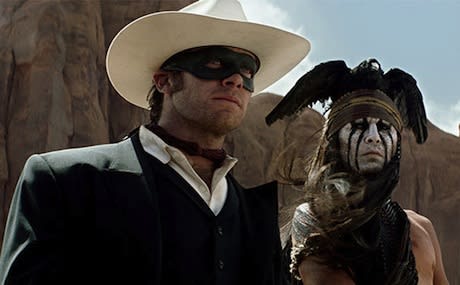In this age of omnipresent vigilante heroes, Gore Verbinski uses his mastery of family-friendly, widescreen grandeur to remind the public of one of the silver screen's first love affairs with a masked do-gooder.
With his partner in franchise building in tow (Johnny Depp), the director of the three enjoyable Pirates of the Caribbean movies hopes to have a new money machine on his hands with this bloated, but charming revival of The Lone Ranger.
Verbinski's take on the cowboy version of Zorro is loosely framed as a fable about tall tales, of sorts. If that sounds noncommittal, it's because the film doesn't feel fully invested in its own sub textual breadcrumbs. That said, the head-scratching moments that crop up throughout give the proceedings a slightly surreal flavour, more of which may have alienated reserved viewers looking for a simple romp, but also could have provided personality in a caper that feels a little dry, at times.
These under-exploited oddities can be attributed to an unreliable narrator. Instead of telling a straight origin story, Verbinski and his screenwriting team explore the distortion of legend by having a young boy encounter an aged native at the "Noble Savage" exhibit of the San Francisco museum in 1933. It's similar to the conceit used in Young Guns II. A possibly senile, perhaps mystical Tonto (Depp) regales the curious lad with a stuttering tale of how the famous masked lawman came to be.
Armie Hammer cuts a dapper figure as the titular ranger, though he spends most of the film as idealistic lawyer John Reid, leaving the fancy action to Tonto until he finds his mojo after a near-death experience, or Christ-like death and rebirth, depending on what you believe. Verbinski ensures every fantastical incident carries a grounded interpretation as well.
Set during the building of the railway in1869, a straightforward revenge plot runs headlong into an epic stand against corruption, with a left-for-dead Reid following the often insane guidance of a Native American warrior with a bird carcass strapped to his head. Individual scenes always manage to entertain, thanks to Verbinski's talent for composing breathtaking vistas and orchestrating zany chases, as well as the palpable chemistry between Hammer and Depp (the former making a great straight man for the latter's whacky hi-jinx), but taken as a whole, the film's 149 minutes drag on.
Multiple climaxes are great in the bedroom, but can grow tiring in a theatre seat. There are plenty of nods to the iconic ABC series for retro fans and the elderly — opportune use is made of the "William Tell Overture" and cheesy tropes like the Ranger's famous exit are well-handled — and the movie carries the same broad appeal of Verbinski's previous crowd-pleasers.
It's definitely worth a viewing if you're into classic cinema adventure, but it remains to be seen if audiences will respond to train destruction like they do city levelling and swashbuckling.
(Buena Vista)With his partner in franchise building in tow (Johnny Depp), the director of the three enjoyable Pirates of the Caribbean movies hopes to have a new money machine on his hands with this bloated, but charming revival of The Lone Ranger.
Verbinski's take on the cowboy version of Zorro is loosely framed as a fable about tall tales, of sorts. If that sounds noncommittal, it's because the film doesn't feel fully invested in its own sub textual breadcrumbs. That said, the head-scratching moments that crop up throughout give the proceedings a slightly surreal flavour, more of which may have alienated reserved viewers looking for a simple romp, but also could have provided personality in a caper that feels a little dry, at times.
These under-exploited oddities can be attributed to an unreliable narrator. Instead of telling a straight origin story, Verbinski and his screenwriting team explore the distortion of legend by having a young boy encounter an aged native at the "Noble Savage" exhibit of the San Francisco museum in 1933. It's similar to the conceit used in Young Guns II. A possibly senile, perhaps mystical Tonto (Depp) regales the curious lad with a stuttering tale of how the famous masked lawman came to be.
Armie Hammer cuts a dapper figure as the titular ranger, though he spends most of the film as idealistic lawyer John Reid, leaving the fancy action to Tonto until he finds his mojo after a near-death experience, or Christ-like death and rebirth, depending on what you believe. Verbinski ensures every fantastical incident carries a grounded interpretation as well.
Set during the building of the railway in1869, a straightforward revenge plot runs headlong into an epic stand against corruption, with a left-for-dead Reid following the often insane guidance of a Native American warrior with a bird carcass strapped to his head. Individual scenes always manage to entertain, thanks to Verbinski's talent for composing breathtaking vistas and orchestrating zany chases, as well as the palpable chemistry between Hammer and Depp (the former making a great straight man for the latter's whacky hi-jinx), but taken as a whole, the film's 149 minutes drag on.
Multiple climaxes are great in the bedroom, but can grow tiring in a theatre seat. There are plenty of nods to the iconic ABC series for retro fans and the elderly — opportune use is made of the "William Tell Overture" and cheesy tropes like the Ranger's famous exit are well-handled — and the movie carries the same broad appeal of Verbinski's previous crowd-pleasers.
It's definitely worth a viewing if you're into classic cinema adventure, but it remains to be seen if audiences will respond to train destruction like they do city levelling and swashbuckling.
